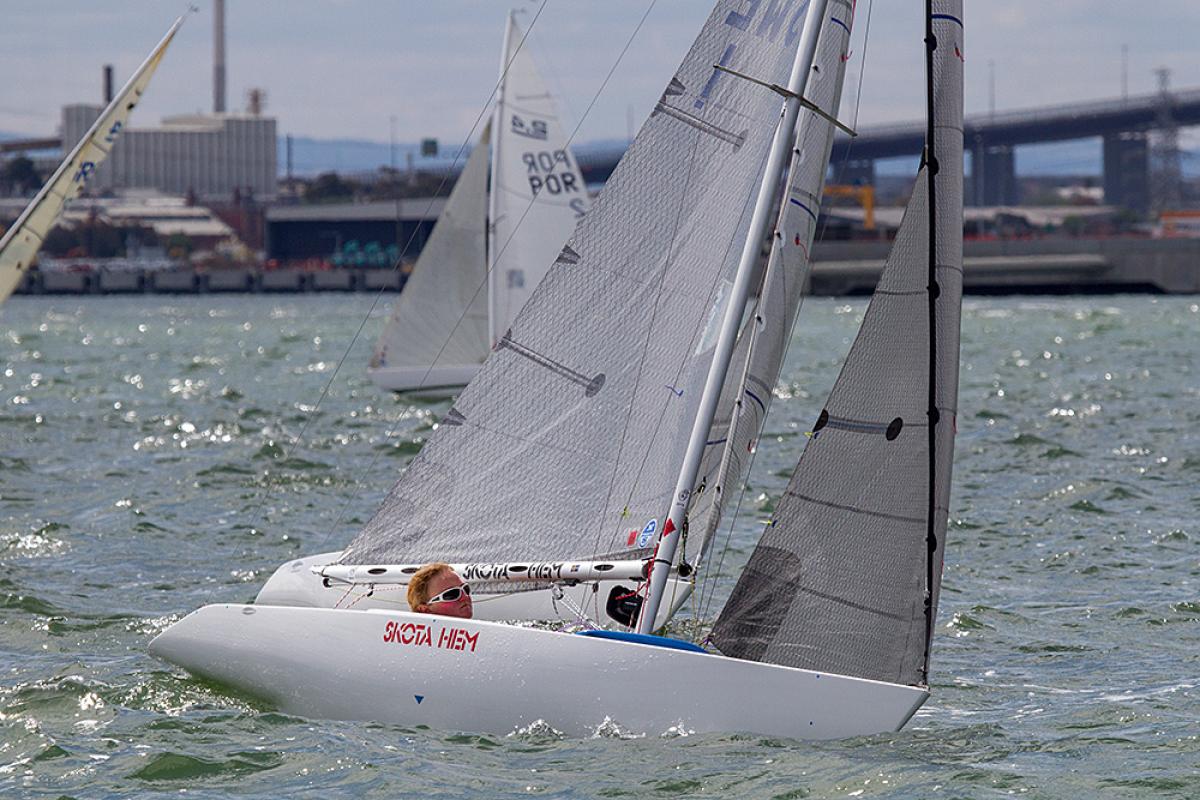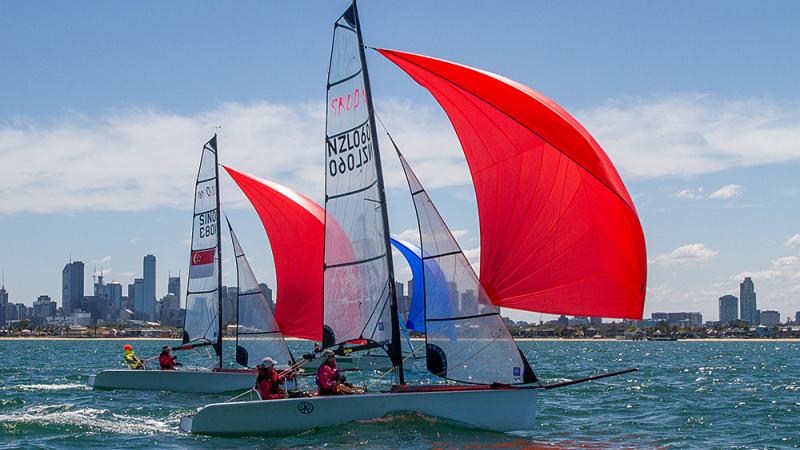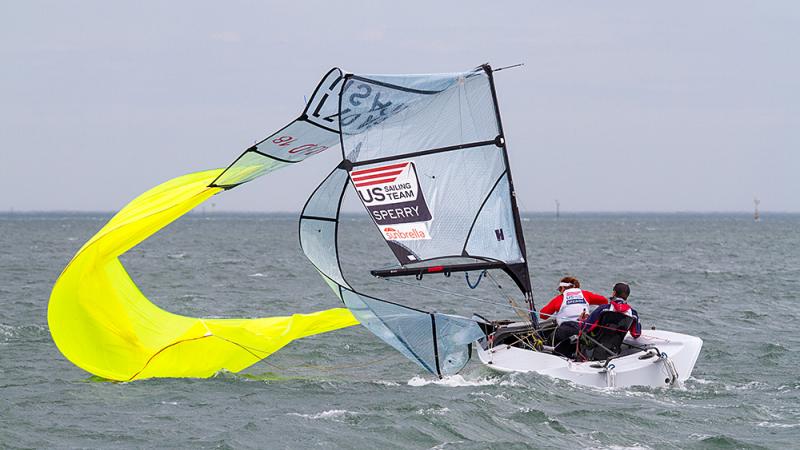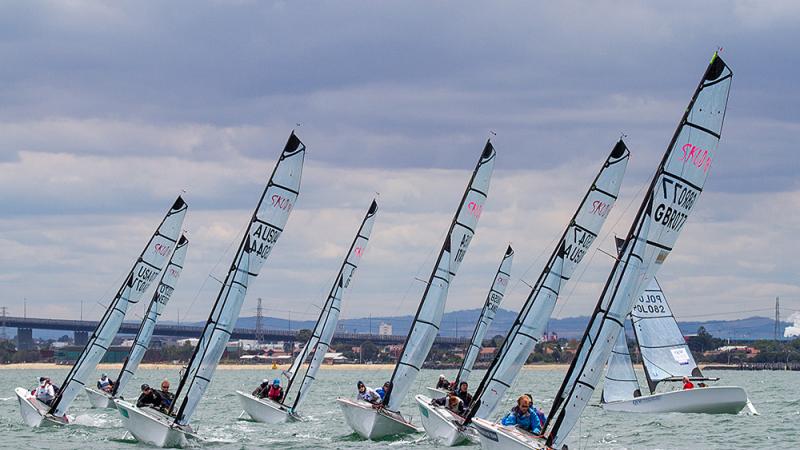At 16, Sweden's Fia Fjelddahl has Rio 2016 in sight
The Swedish sailor is in the hunt for Rio 2016 qualification in the 2.4mR race. 01 Dec 2015
Sweden's Fia Fjelddahl, at 16, is the youngest competitor at the Para World Sailing Championships, which has been held 28 November – 3 December in Melbourne, Australia.
Sweden's Fia Fjelddahl, at 16, is the youngest competitor at the Para World Sailing Championships, which has been held 28 November – 3 December in Melbourne, Australia.
Although young, she has a wise outlook on sailing, thanks to a strong sailing background and competitive atmosphere in Scandinavia.
"I usually sail dinghies like the Optimist, the Europe and 29er and before each race, it's very systematic,” Fjelddahl said. “At first you compare your speed and then you check which side of the course is better but no one's been doing that here (in Melbourne). The fleet have just been checking their speed and I'm like ‘woah, don't you want to see which side of the race course is good?’”
"I've been choosing the right side of the course because the best people have been choosing the left side of the course. All the boats are over there so I have free wind and more space to navigate. There isn't much difference on each side, the leaders are just better and have more speed than me.”
Over on the right side of the Williamstown, Melbourne, race track, the young Swede has been impressive and sits 16th in the 2.4mR after eight races and occupies the final Rio 2016 Paralympic Games spot on offer. That is not bad for her first event in the 2.4mR.
"I thought I was going to be last because I've only sailed this boat for two and a half months,” Fjelddahl said. “It's a big surprise that I'm around 20th. I just wanted to have fun and have experience and if I get the chance to get a Paralympic place then I'll grab it.”
The youngster is yet to look at the overall results and consequentially, has been sailing without fear and pressure.
"I like to feel cool and not stressed when I sail,” she said. “I say to myself what I'm going to do before each race. It's like I'm meditating whilst I'm sailing. If I don't look at the results I won't be stressed.”
Fjeddahl knows that Rio 2016 is a realistic goal having beaten the odds before.
"When I was sailing Optimists, my goal was to qualify for the Nordic Championships and I did it,” Fjelddahl said. “My friends think I'm doing really awesome. But I don't know if they see it as big competition. They just see me in Australia on the other side of the world. My friends said to me, if you're going to Rio, then we have to go to Rio. They have set up this whole team who would cook food and clean for me in Rio which is very funny.”
The dream of reaching the Rio 2016 Paralympic Games is within touching distance with three races remaining at the Para World Sailing Championships. Fjeddahl is unaware of where she's placed at the regatta.
“I asked if I was allowed to tell her if she was in with a chance of qualifying so she was able to think about some tactics, but I haven't had a clear answer on that question yet,” her coach, Sara Sandberg said.
Fjeddahl responded: "I would like to know why someone may be tacking over me all the time because I would want to avoid that person. I won't change my plan though. I think I sail better, calmer and when I'm doing my own thing.”
Doing her own thing is working in Williamstown, but it is not an uncommon trait for Fjeddahl.
The 16-year-old started sailing when she was 8 in summer camps before moving into club racing at the age of 9. At first Fjeddahl feared some aspects of the sport due to her impairment, form of cerebral palsy, and avoided going out onto the water when the wind was up and the waves were high.
Watching her friends progressing on the water made her realise she needed to make her own choices.
"Because I had my [impairment], I always lacked some technique with tacks so I always had to think better,” Fjeddahl said.
Whilst Fjeddahl learnt her trade sailing dinghies alongside able-bodied athletes, her impairment meant that she also qualified to sail within the Paralympic disciplines.
Her coach, Sandberg and the Svenska Seglarförbundet, the Swedish Sailing Federation, knew about Fjeddahl but at such a young age, being thrown into the pressurised arena of Paralympic sailing would be a risk. But the International Paralympic Committee's decision to remove sailing from the Tokyo 2020 sporting programme prompted an immediate response.
"We have known about Fia for quite a long time but never got to know her,” Sandberg said. “We understood she wasn't interested in Paralympic sailing, this was several years ago, but we were talking to her coaches and when sailing went out of the Paralympics for Tokyo, we knew it was important to get new nations sailing.
"In Sweden, we felt a bit of shame in that we didn't have Paralympic sailors because Sweden is a good sailing nation and we've had many sailors in many Paralympic Games. I called her coach and asked if Fia was interested in Paralympic sailing but she never really gave an answer. It took three weeks and then finally her coach said, ‘I think she does.’
"It was a yes and I loaded the boat onto the car and drove to Gothenburg, and she had it to start playing with and then some weeks after that I was down in Malmo, talking to Fia and her mother. She wasn't training in the boat as no one could coach her because where they trained at school, they didn't have a crane to launch it, so she had to train somewhere else.
"I went there for two days and we started in no wind, we gave it a try and after that we went to the west coast and started training more.
"We got as many people involved as we could. Stellan Berlin [nine time Open 2.4mR World Champion], is a good friend of ours, and we asked him to give us some time and he did. We've had support from Swedish Sailing Federation and Sweden's 2.4mR sailors.”
Fjeddahl also benefitted from the support of the World Sailing Paralympic Development Programme, a five-day coaching clinic that took place before the event.
"Fia is very good at analysing the situations,” Sandberg said. “That is her advantage here. Before we came to Melbourne, we maybe had 10 hours in the boat. She's used to big fleets though and not all the sailors here are. She's figured out her tactics and she knows how to make her own plan, not looking at the top athletes.”
Sticking to a plan is vital and there can be no regrets in Williamstown as the 2015 Worlds act as the final qualifier for Rio 2016. The 16-year-old has her plan and her focus: Rio 2016.
For more on the 2015 Para Sailing World Championships, visit the event website.

 Facebook
Facebook
 Instagram
Instagram
 Twitter
Twitter
 Youtube
Youtube
 TikTok
TikTok
 Newsletter Subscribe
Newsletter Subscribe







